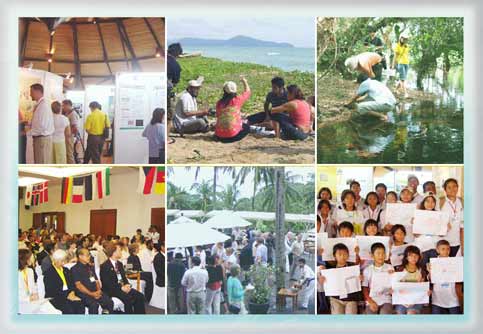
We have many new happenings within the GLOBE community to share with you. Dr. Ed Geary, GLOBE Acting Director, will be sending out a monthly Director’s Message to all Partners that you should be receiving very soon. In the meantime, I am pleased to share with you our new Regional Newsletter format and to provide you with an update of what is occurring at the GLOBE Program Office and in the GLOBE Community around the world!
You will find four sections within the Newsletter — Announcements regarding important dates and GLOBE Program Office activities; Regional News containing information about important milestones celebrated by GLOBE Partners around the world, strengthening GLOBE Learning Communities and tools to facilitate use of the Partner Administrative Page of the GLOBE Web site; Science briefs about GLOBE's new Earth System Science Projects (ESSPs) and updates from GLOBE's Chief Scientist; and Education updates about GLOBE events and products.
We hope that the information we are reporting on is helpful to you as you continue to recruit, train and mentor GLOBE teachers. We encourage feedback about our new online Newsletter. Feel free to send your comments and to suggest any additional information that you wish to be included in future newsletters so that, together, we work to expand communication of current developments in our vibrant, interconnected, worldwide GLOBE Community.
Sincerely,
Teresa J. Kennedy, Ph.D.
Director, International/U.S. Partnerships and Outreach & U.S. Country Coordinator
The GLOBE International Advisory Committee is an advisory body organized exclusively for the GLOBE Program. The purpose of this advisory body is to provide GLOBE Regional Consortia a formal mechanism for community input in the overall implementation, enhancement, and sustainability of the GLOBE Program. The GIAC has been established for advisory purposes and does not hold binding authority or fiduciary responsibility for activities of the GLOBE Program. The GIAC will provide advice to the GLOBE Director that could assist GLOBE to make progress toward our NGG goals including student-teacher-scientist partnerships, regionalization and issues surrounding programmatic sustainability around the world.
The GIAC will:
The first GIAC meeting took place at the 10th GLOBE Annual Conference in Phuket, Thailand, on 29 July 2006, where initial discussions included the establishment of the GIAC Charter. The next GIAC meeting will take place in Washington D.C. on 8–9 January 2007. Please contact your GIAC Regional Representative to provide your input into these discussions.
Many distinguished guests attended the conference representing The Thailand Royal Development Projects, Thailand Research Fund, the United Nations Environment Programme (UNEP), the United Nations Educational, Scientific and Cultural Organization (UNESCO), and the World Meteorological Organization (WMO), all providing informative keynote presentations concerning Education for Sustainable Development, Student Research, and partnerships with GLOBE.
NASA and NSF representatives announced GLOBE's new Earth System Science Projects (ESSPs) on the opening day of the conference. In addition, over 50 presentations led by the GLOBE community highlighted topics within five featured conference stands: Collaborative Research, Sustainability Education in the Context of GLOBE, GLOBE Assessment and Implementation, GLOBE Capacity Building, and GLOBE Program Office Special Sessions.
Country Coordinators met within their regional breakout groups and discussed the future development of their respective regional consortium as described in the Regional News Section of this newsletter. In addition, eight GLOBE Alumni representing all six GLOBE regions attended the conference and met throughout the week. The alumni presented a draft of their vision and purpose along with an expression of deep gratitude for the support and guidance from their regional coordinators and the GPO. They also expressed that the continued sense of belonging was important to them and pledged their cooperation in all GLOBE activities. In addition, 71 current GLOBE students attended from four countries.
Read more about the 2006 Annual Conference, including viewing the conference agenda, presentations, reports, photo gallery and information about the Marine Symposium.
The Conference, hosted by the University of Texas at Tyler and Austin, in partnership with Northern Michigan University and Southern Connecticut State, will be held at the Historic Menger Hotel. We hope to see y'all there! View more information about the GLOBE Annual Conference on the homepage of the GLOBE Web site.
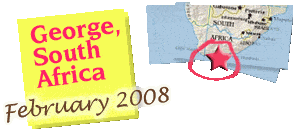
In addition, the information gathered through the Annual Partner Survey provides new insights on how to strengthen partnerships and promote collaborations in your region and around the world, while also helping to define your plans for the upcoming year.
The 2006 survey must be completed by 26 January 2007. You can begin updating your information and adding to your data base now. Don’t wait! To log on to the 2006 Partner Survey, click on the following link, or copy it into your Web browser:
http://www.globe.gov/fsl/ADMIN/PARTNERSURVEY/DisplaySurvey.pl
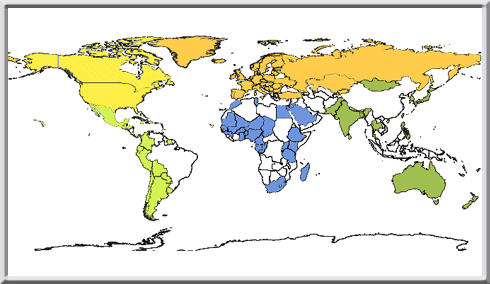
 Costa Rica Costa Rica |
 Jordan Jordan |
 Portugal Portugal |
 Ecuador Ecuador |
 Luxembourg Luxembourg |
 Trinidad & Tobago Trinidad & Tobago |
 Estonia Estonia |
 Marshall Islands Marshall Islands |
 United Kingdom United Kingdom |
 The Gambia The Gambia |
 Mexico Mexico |
 Denmark Denmark | Mr. Jimmy Mangelsen, Country Coordinator |
 Germany Germany | Mr. Mark Mueller, Training Point of Contact |
 Maldives Maldives | Mr. Ahmed Saleem, Country Coordinator |
Send your finished article to your GLOBE Regional Desk Officer. Hard copies of completed release forms can be faxed to the GLOBE Program Office or sent to:
GLOBE Stars Photo Release
The GLOBE Program
P.O. Box 3000
Boulder, CO 80307-3000 USA
Fax: 303-497-2638
| Africa | Asia and the Pacific | Europe and Eurasia |
| Latin America and the Caribbean | Near East | North America |
Country Coordinators, GLOBE Master Trainers, and other Asian representatives met throughout the week and initiated discussions on the development of a regional collaborative project as part of a broader initiative to establish stronger connections within the region and coordinate efforts. The group decided upon pursuing a watershed study as a collaborative project to recognize the work of student groups from the region since this theme ties many of the current interests and directions of the region together as well as incorporates many of the protocols from the GLOBE investigations. To learn more about your country's involvement in the regional collaborative project and how to become involved, please contact your Country Coordinator.
A regional meeting and training event is currently being planned to bring all Country Coordinators together to further the development of a consortium for the region. More information about this upcoming event will be available soon!
GLOBE Europe met in January 2006, in Paris, France. The next GLOBE Europe meeting will be held in Budapest, Hungary, in April 2007. More information will be sent to European and Eurasian country coordinators as plans are finalized.
Karl Hetland, Chair for GLOBE Europe, introduced International Polar Year (or IPY), which all countries are participating in (see <http://www.ipy.org/>). There are several GLOBE projects linked to this, including GLOBE's new NSF project "Seasons and Biomes", as well as a new fish project similar to Arctic POPs that is being lead by GLOBE Norway. Other regional projects include:
Other regional highlights include the recent activities of Geir Endregard, of the Norwegian Institute for Air Research (NILU), who presented valuable information about a Norwegian Sustainable Development initiative now launched in English at <http://www.sustain.no/>. The Web site covers a broad set of both social and environmental activities. In addition, there are potential links to the GLOBE UK Sustainable Development initiatives. For more information please see the GLOBE Europe Web site at http://www.globe-europe.org/.
All participants in the regional meeting acknowledged the work produced as a result of the past two regional meetings that took place in Costa Rica and Perú in 2005, and agreed to formally create the Latin American and Caribbean Consortium (Consorcio Latinoamericano y del Caribe-CLAC). Key officers were identified along with specific roles and responsibilities for each position. See the GLOBE Star on this event.
An impressive component of the workshop was the participation of 28 trainers from the region's Master Trainer Program -- 4 Master Trainers and 24 Master Trainer Candidates representing 13 countries in Latin America and the Caribbean. Representatives from Spain and the United States also attended the event, resulting in the largest Master Trainer activity occurring in the region. Representatives from the World Meteorological Organization, the Argentine Meteorological Services, UNESCO, and many other organizations participated in the event. See the GLOBE Star on this event.
The second Latin American and Caribbean Consortium Meeting will take place in Saber City, located in Panama City, Panama, at the CIALT Center on 2–3 February 2007, followed by a Master Trainer event on the 5–7 February 2007. More information will be sent to all countries in the region soon!
The next North America Regional Meeting will be held in conjunction with NSTA's 2007 Conference on Science Education on Wednesday, 28 March 2007, in St. Louis, Missouri. The meeting will take place the day prior to the start of the convention just as it did during the 2006 NSTA conference. View a summary of last year's event.
It was also proposed that a North American Planning Meeting be held prior to the scheduled meeting in March at NSTA, tentatively proposed for January 2007. An upcoming region-wide teleconference IS scheduled to occur in October to focus on identifying North American Regional Representatives, the Canadian and U.S. perspectives on GLOBE implementation, the agenda for the GLOBE North America Regional Conference at NSTA, as well as the 2007 Annual GLOBE Conference that will be held in San Antonio, Texas. More information, including call-in instructions, will be sent out in the next two weeks.
Reminder: The 11th GLOBE Annual Conference will be held in San Antonio, Texas from 29 July – 3 August 2007. Mark these dates on your calendar now! The final day of the conference will include many workshops and protocol refresher trainings, including trainings for any new Earth System Science Project (ESSP) activities that have been developed.
The Conference, hosted by the University of Texas at Tyler and Austin, in partnership with Northern Michigan University and Southern Connecticut State, will be held at the Historic Menger Hotel. We hope to see y'all there! View more GLOBE Annual Conference information located on the homepage of the GLOBE Web site.
The GLOBE Program is continuing in our efforts to connect with our UCAR Affiliates in over 60 countries. UCAR Affiliates have already expressed interest in partnering with GLOBE and assisting in expanding their learning community to include GLOBE Partners around the world. Please visit the May 2006 newsletters found in the Partners' Corner of the GLOBE Web site for more information on our efforts or visit the UCAR list of International Affiliate Institutions for contact information for the UCAR Affiliates nearest you.
Log in using your Partner ID and go to the Administration Page of the GLOBE Web site. You can send a GLOBE Massmail to all registered schools with email addresses in your country or region by clicking on “Send a Mass GLOBEMail message” under the communications section. Be sure to select the 'email reminder option' so everyone will be notified to log-on to with their GLOBE ID and password to see your message. In case a teacher has forgotten the school's username and password, a tool is included to assist in requesting this information.
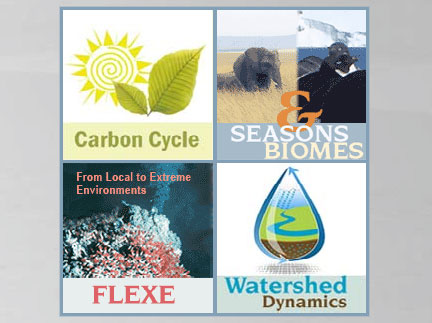
For more information about these projects, visit the ESS Projects announcement.
"Blog" is short for "web log." Usually, blogs are used to post short notes on the Web and readers are invited to comment. Typically, "bloggers" (those who write blogs), write about their personal lives or discuss their opinions about current events. The Chief Scientist's blog will be about environmental science, with an emphasis on observations of natural phenomena in our daily lives. Readers are invited to make comments, and to react to each others' comments.
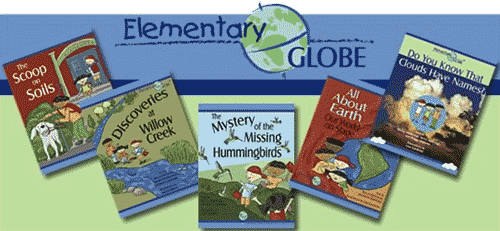
Information on the 2007 event will be posted on the GLOBE Web site later this fall. Help us reach our goal of 10,000 observations in 2007. For more information, contact Kirsten Meymaris <kirstenm@globe.gov>.
GLOBE at Night is a collaboration between The GLOBE Program, the National Optical Astronomy Observatory (NOAO), UCAR Office of Education and Outreach, Centro de Apoyo a la Didactica de la Astronomia (CADIAS), Windows to the Universe, and Environmental Systems Research Institute, Inc. (ESRI).